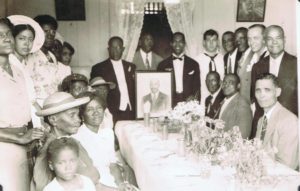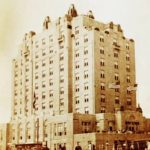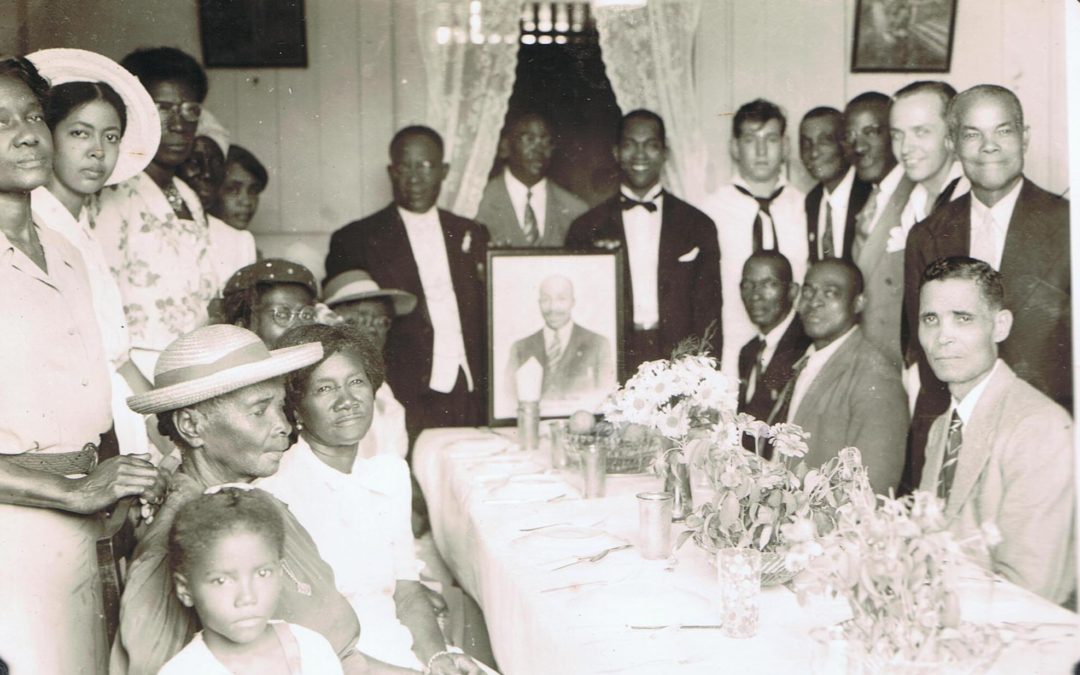
Navy veteran and Peace Mission member Philip Life, a conscientious objector who served in the Navy, told Peace Mission members that he brought Divine’s message to the segregated military — and that a “Divine intervention” saved him from a Court Martial.
The theme of this year’s Black History Month is “African Americans in Times of War.” Father Divine lived through several, including World War I, the Spanish Civil War, World War II and the Korean War.
Because he revealed little about his early life, it’s almost impossible to know if seeing the effects of these wars influenced Divine’s message or the formation of the International Peace Mission Movement — though it seems a certainty.
Over the years, Divine made numerous appeals to avert or end war:
- In his 1936 “Righteous Government Platform,” he wrote that the United States should “Abolish in all educational institutions and from books used for educational purposes all references to racial conflicts or differences, national glory through military feats, etcetera, with legislation making it a misdemeanor for any educator to teach such to his classes.”
- In 1938, before World War II broke out, Divine suggested to heads of state that some of the disputed Eastern European territories be purchased as a way to prevent bloodshed. Later, when war arrived in Europe, Divine again appealed to heads of state, suggesting that North, South and Central America be united, with the idea that their combined resources would prevent an “invasion of the Western Hemisphere.”
- In 1939, Divine told attendees at a New York City banquet that a universal end to “to all segregation and discrimination among the people … will bring an end to all war, and there will be no more wars among the nations, for “where there is division, there is strife.”
- In 1942, at the height of WW II, Divine told an interviewer, “… if we as the representatives of the democracies, could harmonize with one accord for one common purpose, why, naturally we would … bring an end to warfare and bloodshed immediately … we could bring an end to warfare and make null and void the violence of Hitlerism and the Japanese and all warmongers that are endeavoring to destroy our civilization.”
Though he called for peace, he also preached — and practiced — patriotism. Divine built his movement, in part, on principles of Americanism, and encouraged his flock to do their duty to the nation, which he believed was the “Kingdom of God on earth.” According to Peace Mission documents on a now unused website, “There was no evasion of the draft when it was instituted; some followers enlisted; others, with the religious conviction not to fight for any cause, suffered imprisonment or went to work camps.”

Father Divine brokered a deal to house members of the Coast Guard — provided that the troops remain desegregated — at the Brigantine Hotel in New Jersey.
In the early 1940s, he heard from members of the Coast Guard who were being housed in a facility with little heat, poor bathroom facilities, and limited access to drinking water. In response, Divine brokered a deal to house members of the Guard at the Peace Mission’s Brigantine Hotel in New Jersey — on the condition that the troops there be desegregated. In return, the Coast Guard paid $1 a year to lease the building for the duration of the war.
It’s been written that later in life, Divine’s politics became more conservative, and that he took an ill view of labor strikes because he believed they threatened the “Korean War effort” and would “undermine the foundations of our government, which we all revere.”
One constant, however, was that he remained a staunch supporter of civil rights — and encouraged his followers to uphold his teachings no matter where they were. According to LibertyNet, in 1992 a Navy veteran and Peace Mission member named Philip Life, who was a conscientious objector, spoke about bringing Divine’s message to the segregated military — and the “Divine intervention” that saved him from a Court Martial.
“In San Diego, California during hospital training we slept segregated, ate segregated, and had segregated rest rooms. Whenever possible I disobeyed the signs designating color. … down in Panama of course I refused to segregate again,” he said. “I attended Peace Mission services 2 or 3 times a week and was investigated by the Shore Patrol (Naval Police) and also by a Navy Chaplain. Both of them learned about Father Divine and enacting The Bill of Rights.”
At one point, Life said, his job was to type up forms for the hospital dispensary office — but he refused to include the subjects’ race, in line with Divine’s teachings. “I would designate them as to their nationality and not their race … The Captain found–out probably some of the boys from the south who didn’t like what I was doing told him,” he said.
The situation escalated, and Life’s captain first threatened to have him shot, then requested the initiation of Court Martial procedures. “I wrote this letter and told Father the whole situation,” Life told Peace Mission followers, “and after a short while I got a letter back from Father: “Everything will be all right. You’ll get the honorable discharge you desire.” Soon thereafter the yeoman came and said “You’re off the hook, Life. The Captain got a letter back from Washington telling him to leave you alone.”


Recent Comments